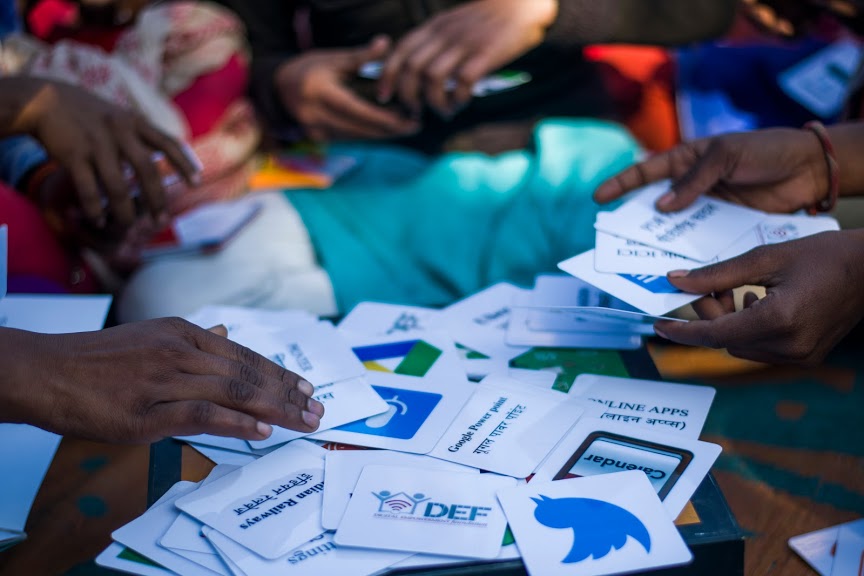
Twenty-year-old Rinki Chouhan lives in a small house with a big family of 10 where her father and brother, both daily wage workers, are the only earning members of the family. For a family of 10, the household income is mere Rs. 3000. Rinki is the first person in the house to complete her education up to Class XII. Though Rinki completed her school, she could not go for further education due to the financial restrictions. But with new digital classes, as part of GOAL project, she is getting a chance to learn again. The story is not too different for other girls who’ve managed to reach up to class XII in her village, which is located in a backward tribal community area. Rinki’s oldest sister was married off last year at the age of 21. After Rinki put a halt to her education, she was aware that her parents would also have her married off soon. Because that has been the norm in the family and the community, Rinki had accepted her fate.
“My parents want me to get married this year. But if I had my way, I’d want to be a nurse first before getting married. However, our financial conditions do not allow me to continue my studies,” she laments. “But with the new digital classes, I’m getting a chance to learn again.”
GOAL (Going Online As Leaders), an initiative by Digital Empowerment Foundation in collaboration with Facebook is also supported institutionally by the NITI Aayog and their WEP programme. The project aims at linking urban women leaders, all experts in their respective fields, to five tribal girls each who will be trained in digital literacy by our ground staff and mentored by the women leaders to become village-level women leaders and agents of change.
During the six-month training and mentorship programme, the women leaders, with expertise in their respective domains — from business, education and health to politics, arts and entrepreneurship—inspire, guide and encourage at least five tribal girls each to become village-level digital young leaders. In its pilot stage, 40 girls were engaged within Betul district of Madhya Pradesh, a tribal region. The programme is now in its first phase and will be rolled out in five states: West Bengal, Madhya Pradesh, Jharkhand, Odisha and Maharashtra with 50 mentors and 200 mentees.
As a part of the project, young girls are trained in functional digital literacy and mobile literacy; equipped with basic digital tools; and nurtured to inculcate life skills, leadership qualities, advocacy skills and entrepreneurial attitude.
Rinki’s digital literacy trainer is Deepa. Deepa is a recent adopter of digital tools as well. Two years ago, Deepa knew little about what a smartphone or the Internet had to offer her. She had a feature phone in the house but besides making calls to her family, she knew little what to do with the device. However, Deepa decided to enroll for a mobile functional literacy class. That was just the beginning, the exposure or nudge she needed to become digitally savvy. She not only uses her smartphone to search for the answers she needs, she has also become a digital literacy trainer for 10 girls in her village.
Rinki is one of these girls. “When I first came for classes, I was initially scared of using the laptop. I was worried I’ll break it but I’m much more confident about using it now. I love using the Paint application, and also practice typing in English whenever I can,” Rinki shares, adding that she hopes to learn to use the computer well enough to be able to find a job and look up recipes. Rinki is also receiving mentorship from Sonia Jorge, a senior professional settled in Europe. When Rinki speaks to Sonia, she is fascinated. Until her first call with her, she had never spoken to an “angrez” before. Rinki doesn’t understand her accent, so a translator helps them. They’ve had a few conversations to know about each other, and hopes to know about the country that Sonia comes from and the people and cultures present there.
GOAL or Going Online As Leaders is a digital literacy and mentorship initiative that seeks to mobilise urban women, known for their leadership skills or roles, to digitally empower and personally mentor young tribal girls in India. The urban women leaders, who will hold expertise in their respective domains—from business, education and health to politics, arts and entrepreneurship—will inspire, guide and encourage rural and tribal girls to become digitally enabled agents of change for their communities. While Digital Empowerment Foundation handholds the young girls in their journey of digital literacy, the urban mentors help them build life skills and leadership qualities.








